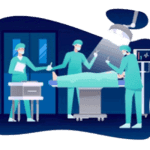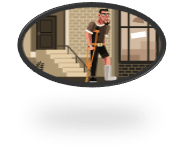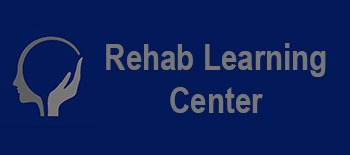Post-Surgical Failure – Achilles Tendon Repair

As part of my series on failure and uncertainty, I am sharing another opportunity with more novice clinicians how these topics are typically a regular part of a healthcare professional’s career. Either that or I have my independent issues. The ‘scene’ is that I am treating a post-surgical patient with an Achilles tendon repair. It was a traditional open repair supplemented with a posterior tibial tendon transfer. The result-Achilles tendon repair failure to some degree.

The patient was a 50-year-old female with a few comorbidities (e.g., diabetes and ulcerative colitis) for which she had a history of using corticosteroids. The surgeon chose the posterior tibial tendon transfer as a reinforcement. The protocol was a little slower than usual.
The patient did not care for the conservative protocol. She mentioned how she had taken a step for balance a couple of times without her boot but assured me she only put weight on her heel and no pushing off with forefoot, etc. I am not great at documentation, but I documented this each time. I also emailed the physician and called the first time this was reported.

She was to be in a boot for five weeks and then heel lift support shoes for another four weeks, gradually cutting the size of the lift down.
At about six weeks post-op, we worked on plantarflexion isometrics in a standing position. We finished the exercise. She tolerated it well. I told the patient to wait until I got her crutches to use them, non-weight-bearing on the involved side, to move back to the table. The patient said, “It’s just a couple of steps,” as I was about 10 feet away. It was just about 3-4 steps, but there was also a sound. I don’t even know how to describe it. I will never forget it, however. Something like pulling your fingers along cellophane, perhaps?

The patient hopped the last step on her good leg to the table. Once she was situated on the table, we looked at each other. I could only mouth, “Are you ok?” She replied, “Something didn’t feel right about that.” My stomach started to turn. I don’t get ill often, and watching injuries, etc., typically doesn’t bother me much but, I felt something coming on.
I palpated and observed along her Achilles tendon. Granted, I was likely in a state of pre-shock or something, but everything appeared ok. Why did I feel like Rabbit from the movie 8 mile though? Palms were sweaty, knees weak, arms were heavy. No vomit on the sweater, but I am nervous. On the surface, I looked calm, but the words won’t come out.
I had to get away. I grabbed some ice placed it on her Achilles region. I had her lie down as I escaped to the restroom. Our session was over. I was 5 minutes behind on my patient schedule, and my next patient was here, but I was not ready.
Once in the restroom, I began to sweat profusely. I was pale. My whole body was tingling. I was dizzy. I had to sit down in a chair. The front office manager was banging on the door. “Are you in there? Your next patient is here.” I think I only grunted. This part is blurry.

After what seemed a lifetime, I emerged. I still looked rough. A colleague had started my next patient. It was precisely the type of patient I didn’t need at this moment, though. You know-the gent you joke and rib with. Well, this was not the time. He also had no filter. He proceeded to say in his outside voice how rough I looked and how it looked like I saw a ghost.
My Achilles repair patient knew something was up. I don’t recall the wording I used. I, unfortunately, did not rehearse it either during my bathroom break. The next hour was also blurry. The patient I was late for was relentless. I took it all, gave nothing back. He still didn’t get it.
The Achilles repair patient called for an appointment with the physician. Hopefully, I had suggested this.

I ended up calling the physician about 2 hours later and gave my story. The patient ended up seeing the physician and had an MRI. It is hard to accurately report these though with recent surgery, and the radiology report alluded to this.

The surgeon did call me and stated that she felt the tendon transfer had failed but was unsure if the Achilles tendon repair was a failure. Time would tell. The physical exam was encouraging.
The physician and patient thought it best that the patient transfer to another therapist at another facility. I tried to state my case for following this through, but I understood.
This situation continues to be a point of reflection many years later. It isn’t even about ‘blame’ anymore. Why didn’t she wait for the crutches? Why wasn’t I holding the crutches? Ugh!
No, it is more about…I don’t even know. Every time I think about the situation it is something else. How to prevent it from happening again. How to not feel like Rabbit again. How to…

I did follow through with the surgeon about eight months later when we were at a conference together. I asked how the patient ended up doing. “She’s doing great. No issues.” Nothing else was said. Would l have felt better if the physician told me I didn’t do anything wrong? That I am a good therapist? Yes, of course. Did or do I now need that? I don’t need it now. Perhaps I did at that time.

I have since made other mistakes. I have since sent post ACL reconstruction patients back to the physician concerning a deep venous thrombosis or pulmonary embolism despite Homans Sign being a poor test and simply having surgery can make the scoring on Well’s Criteria for DVT a bit tricky.
Many times, these were likely unnecessary. Many times, they were to allow me to sleep better at night and not worry about the patient. They did, though likely lead to some lack of confidence in me on the part of the referring physician. More importantly, they let doubt creep into my thoughts and reasoning processes. They likely limited my growth, reflection, use of colleagues, honing my patient interview skills, and overall critical thinking.

Such failures have led to much reflection, discussion with colleagues, additional practice on interpersonal skills, communication, and overall clinical expertise.
The growth, while painful, led to a more comfortable place. If you are experiencing similar career discomfort, I hope you find an avenue or two to help. There are many great options out there. Rehab Learning Center Academy may be one of them.
TL;DR
- ‘Failure’ can be a regular part of career growth.
- Sometimes you might feel like Rabbit in the movie 8 mile. Like Rabbit, it will likely eventually work out.
- You are not alone. There are resources, including collaborative clinical reasoning, utilization of colleagues, and reflection as essential factors for elucidating expert practice in physical therapy.

